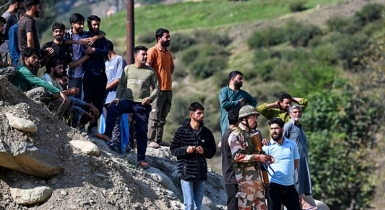
Bangladesh emerged as the world's ninth-poorest nation in 1971 in the world map as an independent country, through a War of Liberation, with a nominal per capita income of only $95, having an infant mortality rate of 210 per 1,000 births, and an average life expectancy of 46.6 years. But the new the country emerged in the South Asian region had to cross lots of challenges during more than five decades under different governments. The new country moved ahead through remarkable transformation, boosting a nominal GDP of $460 billion, Bangladesh now stands as the 35th largest economy globally, with per capita GDP of $2, 765, infant mortality has also drastically declined to 23 deaths per 1,000 births, and life expectancy also soared to 72 years.
There is no denying the fact that Bangladesh, being a promising country, marched ahead in its growth path despite various challenges in line with global changes. After crossing the era as a Least Developed Country (LDC) by the United Nations in 1975, Bangladesh achieved lower-middle-income status in 2015 and is now on track to graduate from the LDC status to emerge as a developing country in 2026 as scheduled.
Bangladesh has been enjoying cash incentives as export subsidies by the World Trade Organisation (WTO). But, when a least-developed country (LDC) becomes a developing nation, as per WTO’s policy, it can't continue to enjoy the same cash assistance as soon as the country emerges as a developing nation. In line with WTO’s policy guidelines to this effect, the Bangladesh Bank being the country's central bank has decided to cut the export subsidy for almost all sectors to reduce the pressures on the country's coffers and as such has to bring down the export subsidy rates gradually. Because, the country can hardly provide such subsidies to the exporters of varied categories, as our country is scheduled to emerge as a developing nation, in 2026.
Exporters are not happy to hear about the policy change of the country's central bank. Country’s exporters have already expressed sheer disappointment over BB’s policy change as regards ongoing incentives, saying the export will be hit hard, if the government continues to follow the policy strictly. The policy change has been launched when the Bangladesh currency has lost its value by about 30 percent in the past two years against the US dollar.
Meanwhile, prominent economists and financial analysts of the country, in their immediate reactions, welcomed the move, as Bangladesh used to give such cash assistance ranging from 1 percent to 20 percent on export earnings in order to encourage exporters in the best interest of the national economy. They viewed, the facility was allowed to the exporters, to make them more competitive in international markets, with a view to raising the income from the biggest foreign currency earning sector. The analysts reported to have lauded the government's move to cut the facility to the exporters under the changed circumstances.
They viewed, the country is already in trouble because of the difficult business environment. If the situation worsens, jobs will not be created at the expected pace. Thus, it will be prudent to prepare for the LDC graduation gradually. Prof Mustafizur Rahman, a distinguished fellow at the Centre for Policy Dialogue. said the significant depreciation of the taka should help exporters to face the changing situation. The cut in cash support will help the government in many ways to save money at a time when there is a cash crunch, said Prof Rahman and urged the government to take other measures to help exporters beef up their competitiveness through better institutional support, less harassment, improvement in the business environment, and the reduction in the cost of doing business.Zahid Hussain, a former lead economist of the World Bank, describes the government move as a step in the right direction since the incentives did not bring about desired benefits in many sectors, but there has to be a proper direction in the process about this in the upcoming budget speech too.
MA Razzaque, chairman of the Research and Policy Integration for Development, said the export subsidies would not be compatible with the WTO rules once Bangladesh graduates. “The gradual nature of adjustments as evident from the circular is prudent. “However, he added, due consideration should now be given to tariff rationalisation, which is the single most important factor in pushing export diversification. "If cash assistance is being reduced solely because of the tight fiscal space, and if for the same reason, restructuring of tariff rates is not getting the desired pace, then it's not the right approach." "Subsidies and incentives can't go on endlessly for all sectors," said M Masrur Reaz, chairman of the Policy Exchange of Bangladesh. According to him, “many firms have been receiving the support for a long time and they have become bigger and the sector's capability has grown." Therefore, they don't require such subsidies, in other way the reduction in the rates will also help reduce unnecessary drag on public finance.
With the passage of time, the maximum rate has now been set at 15 percent and the minimum at 0.5 percent and it would be applicable for January 1 to June 30 this year 2024, Bangladesh Bank being the central bank reported to have announced in a notice. Currently, 43 sectors are eligible for the aid, with the government spending about Tk 9,025 crore annually during the past three years. The new policy change, deemed necessary at this time when Bangladesh is set to become a developing nation in 2026, as scheduled.
Under the situation, if the cash support is withdrawn completely in one-go when the graduation takes place, the export sector might face challenges in the post-LDC period. So, the government has decided to reduce the direct cash assistance in phases from January 1 this year, the BB authorities reported to have said to the media. Accordingly, only four sectors – diversified jute products, vegetables, fruits and products in the agro-processing sector, potatoes, and halal meat and processed meat exporters -- will qualify for the highest rate. The facility was 20 percent for them previously, as lastly reported in newspapers.
The cash assistance on the export earnings of apparel makers in all markets has halved to 0.50 percent from 1 percent. The rate, however, has been kept unchanged at 4 percent for the shipment to emerging markets. The support on furniture exports was lowered from 15 percent to 10 percent, for plastic products from 10 percent to 8 percent, for software and information technology-enabled services from 10 percent to 8 percent, and for motorcycles shipment from 10 percent to 8 percent, the BB circular showed.
Meanwhile, Faruque Hassan, president of the Bangladesh Garment Manufacturers and Exporters Association, in their serious reaction more clearly exposed that the cash incentive has been cut over the years. While categorically exposing the picture, he cited the cases of promising emerging markets such as Japan, India and Australia. The annual shipment of garments to the three nations has risen to about $2 billion, $1.5 billion and $1 billion, respectively, recently. "Reducing incentive for such promising markets is one kind of punishment, whereas there should have been rewards for the garment exporters for exploring opportunities in those destinations” he made it in a more specific way. The incentive has been reduced for the top five garment items that contribute 80 percent to the total earnings from the apparel sector. According to Hassan, the current budget has allowed the incentive up to June this year. But now the government about the change of the policy said the decision about the new incentive scheme came into force on January 1. Many others, also viewed it differently, saying that country’s garment suppliers will be affected as they have already estimated their costs and revenue based on the old incentive package’. The BGMEA chief demanded the government continue the incentive up to 2026 and rename the incentive in the post-LDC era as has been done by other countries. “It is a total disaster," said Shaheen Ahamed, chairman of the Bangladesh Tanners Association. “The government should not have taken such a decision at this time. We will lose the market. “When the government is talking about increasing exports, the reduction will have a negative impact on the sector. Exports will decrease due to reduced incentives."
On the other hand, Masum Miah, executive director of Superex Leather Limited, which is located in Jashore, says reducing incentives will definitely create difficulty. "The government should reconsider this decision. “Already the price of chemicals has climbed and the shipping cost has gone up. As a result, I am already in a tight situation. “Russell T Ahmed, president of the Bangladesh Association of Software and Information Services, said the government should continue to provide incentives for the IT sector as it has great potential.
SM Jahangir Hossain, president of the Bangladesh Fruits, Vegetables and Allied Products Exporters' Association, does not think that there would be much impact of the cut in cash incentive from 20 percent to 15 percent. Shamim Ahmed, president of the Bangladesh Plastic Goods Manufacturers and Exporters Association, said: "Because of the reduced incentives, we will no longer be able to sell products at competitive prices in the export markets. As a result, it will have a negative impact on our business."
In view of this complex situation, the government of Bangladesh has to examine the entire issue thoroughly, in a more pragmatic line of thought marked by realistic mission and vision so that the country's overall interest is in no way jeopardised at this time of mounting challenges prevailing across the globe.
The writer is a Senior Journalist and Media Analyst, writes mainly on Promoting Knowledge Based Society, Socio-Economic Transformation, Climate Change, Rule of Law, Human Rights & Good Governance





































